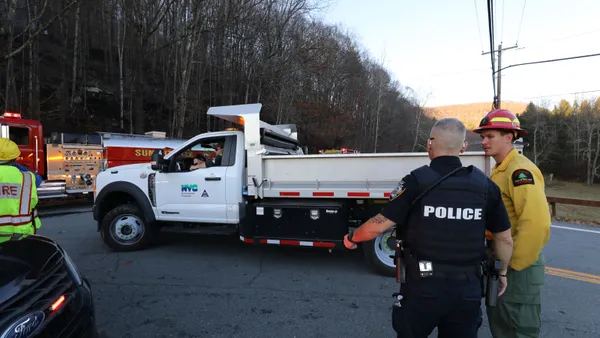Dive Brief:
-
New York City is one of three "flagship cities" participating in the Ellen MacArthur Foundation's three-year food initiative. The Big Apple, London and Sao Paulo are joining with corporate partners, including Danone and Nestlé, to help create a circular economy addressing food industry challenges. The initiative follows the foundation's report, "Cities and Circular Economy for Food," released in January at the World Economic Forum in Davos, Switzerland.
-
Challenges addressed by the initiative include climate change, health problems, pollution and biodiversity loss. Ways to address these problems include regenerative farming, more local sourcing, changing the design and marketing of food, and preventing waste by using byproducts, the foundation said in a release. According to the report, four-fifths of food will be consumed in cities by 2050. Globally, this approach could reduce greenhouse gases equal to 1 billion cars being taken off the road, the foundation estimated.
-
"We feel the need to work hands-on with multiple cities because we know no city is going to face the same situations," Emma Chow, initiative project manager, told Food Dive. "With New York, similar actually to Sao Paulo, you need to go outside of the city to get to the agricultural areas, but we see great potential for them to leverage manpower to motivate a shift to other systems that are good for ecosystems. We think New York also has great potential for innovation."
Dive Insight:
Besides working with the flagship cities, the initiative has partnered with several international companies — food companies like Danone, Nestlé and Japan's Mizkan; waste companies like Italy's Veolia; biodegradable plastic companies like France's Novamont; and fertilizer companies like Norway's Yara International. The project is funded by Portugal's Calouste Gulbenkian Foundation, which focuses on art, social welfare, science and education.
The foundation is betting this global approach can more effectively tackle global challenges posed by issues including food waste, health problems, climate change and pollution. Chow called the corporations "core partners," providing value through different types of corporations and funding mechanisms. She said they represent different voices across the food value chains, and is tasked with putting the foundation's report into action in the next three years.
Action could mean producing more protein that is sustainable — both in where it comes from and how it's produced, Chow said. Key to that goal will be using a circular economy approach — which gradually steps down reliance on consumable resources and transitions to more renewable resources —to reduce environmental damage. She noted some food brands worldwide have already started using this kind of system.
"The system can be effectively designed, whether it’s by a food brand or a chef in your favorite restaurant. They’re designers and have a say in what proteins are produced," Chow said. "We see that as part of the total that consumers can look at and see implications of their decisions — to produce food that’s healthy but also part of an overall holistically designed system."
Food companies could benefit by showing consumers and other manufacturers they're walking the talk when it comes to sustainability, reducing waste and tightening up on production efficiency. It could also mean saving — and even making — money, since the way food is produced and distributed is inherently wasteful, Chow said. She called the current system damaging to health and the source of economic losses along the way.
However, with new mechanisms focusing on all areas of the supply chain, changing the system could generate business opportunities and tackle issues such as diversity loss and climate change, she added.
Other projects aimed at this kind of change have focused on specific parts of the food system rather than implementing a system-wide approach, Chow said. This is why the foundation hopes using cities as the starting point will have a lasting impact. Food systems are complex, and it's a challenge to apply effort in all areas, she added.
"Rather than reducing food waste, while that needs to be done, we can’t lose sight of the ultimate goal and ultimate vision. ... How can we reimagine the entire approach based on circular economy thinking?" Chow said. "It's not only undoing the damage, but being impactful. We can reenergize the natural system."
Whether this project can make a tangible difference remains to be seen, but there will likely be progress reports and a wrap-up evaluation in three years. Meanwhile, cities and food companies may make some of these new strategies permanent, altering their practices and carrying forward into the future.
The foundation's report estimated cities could save $700 billion by reducing edible food waste and finding a use for byproducts, so the incentive seems to be there. But this initiative has its sights set on even bigger things.
"Cities can catalyze impacts far beyond their boundaries," Chow said. "The ultimate goal is connecting people with food — a powerful relationship that we run the risk of dissolving over time. We need to make sure we strengthen, rather than erode, the relationship between food and people."











